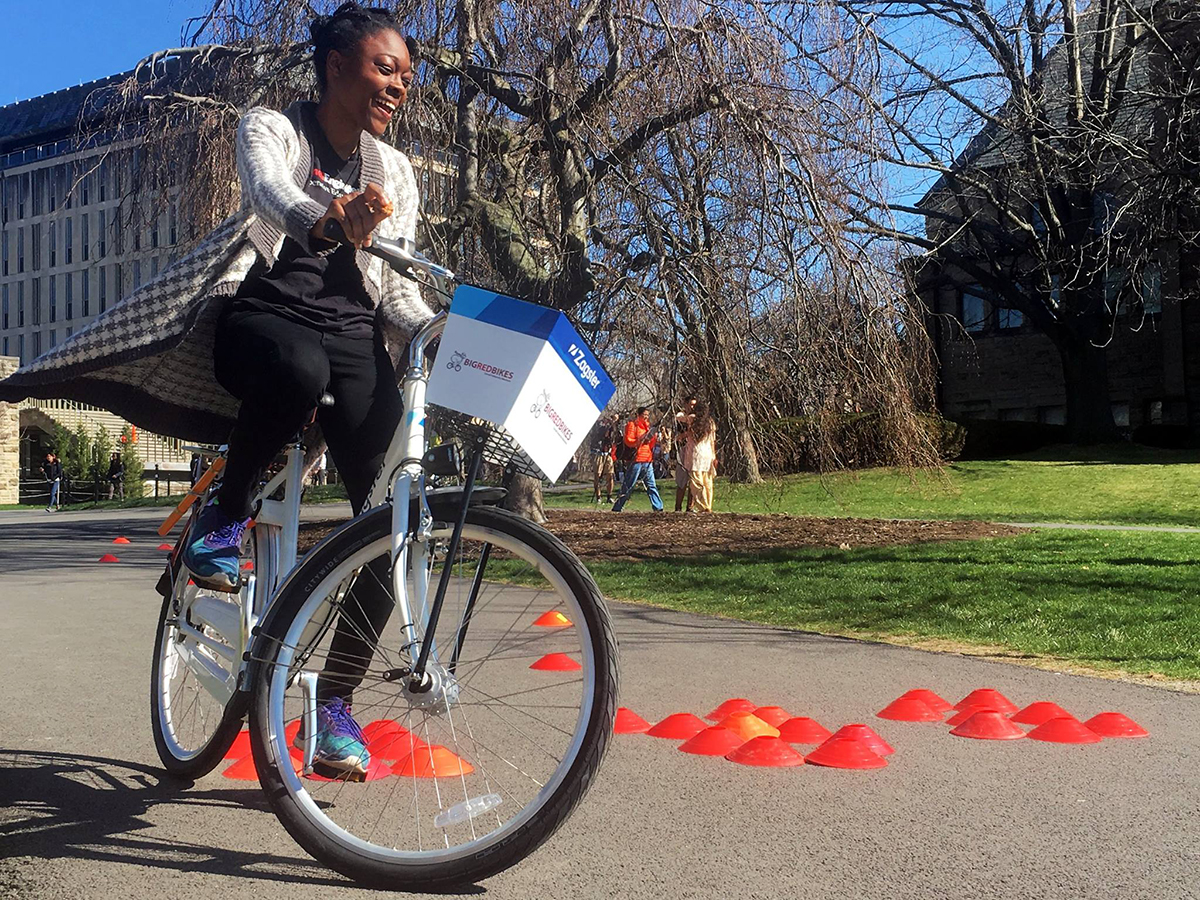Bikes on demand go anyplace, on campus or off
By Nancy Doolittle

On-demand bike sharing – commonplace in major metropolitan areas – became a reality at Cornell April 14 at a ribbon-cutting ceremony outside Kennedy Hall, with about 50 onlookers eying the Zagster bikes gleaming bright white in the afternoon sun.
The Big Red Bikes program features a fleet of 32 bicycles, with five pick-up/drop off bike-rack stations on campus: at Balch Hall, Kennedy Hall, Stocking Hall and Grumman Hall, and between Olin Library and Stimson Hall. The program will be maintained by Zagster, a national provider of bike-share programs for cities, universities, businesses and properties, in partnership with the Big Red Bikes student organization and Cornell’s Transportation Services.
Anyone 18 or older who joins the program can check out a bike and pay-as-they-ride at $3 per hour. Regular users can purchase a monthly or annual pass that allows an unlimited number of rides and the first hour of every ride is free. After the first hour, pass-holder rides cost $3 per hour.
Big Red Bikes received funding from the Student Assembly and Cornell Transportation Services to start the program. Once registered online, riders request a bike via the Zagster app or SMS text message, are sent a code to unlock a bike, ride it as they wish, and then drop the bike at any Zagster bike station.
Calling the new program both sustainable and convenient, Susan Powell of Transportation Services said it is a pilot, during which campus response will be measured.
Jung Won Kim ’18, recently elected president of the Student Assembly (SA), said the program showcases the assembly’s goals of increasing student engagement, involvement and leadership. Like the role of the SA in the formation of Anabel’s Grocery, setting up the Big Red Bikes program was logistically challenging and its implementation impressive, he said.
Kim and six Big Red Bike committee members – Blanche Shao ’19, Venus Dulani ’19, Yorda Girmay ’19, Erin Tou ’18, Nicholas Kan ’19 and Yabework Abebe ’19 – did the ribbon-cutting, while other committee members set up bikes outside Olin Library.
“Our undergrads are investing in our infrastructure, in our transportation … not just for their four years but beyond that,” said Gary Cremeens, manager of outreach and new media in Cornell’s Transportation Services.
Fernando de Aragon, executive director of the Ithaca Tompkins County Transportation Council, noted that reducing the number of automobiles driven in the county depends on providing buses, car-share programs, bike lanes and trails – and bike shares. He and Vikki Armstrong, director of Bike Walk Tompkins, voiced their optimism about creating a safe walking and biking culture throughout the county. This program will be “a terrific asset to the university and eventually, I hope, it will move to the rest of the community,” de Aragon said.
Media Contact
Get Cornell news delivered right to your inbox.
Subscribe